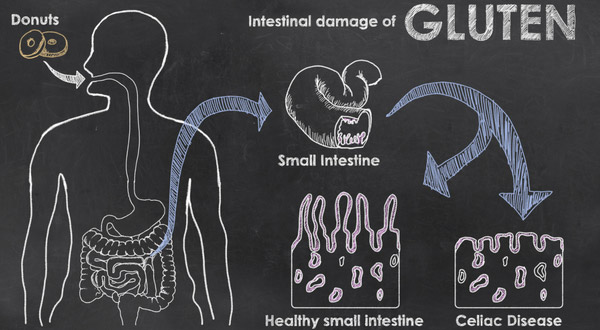Celiac disease is, in essence, an allergy to gluten. When people with celiac disease eat gluten, they have a bad physiological reaction, the symptoms of which can include bloating, diarrhea, skin rashes, and fatigue. However, what’s a going on inside the body to cause these symptoms? What actually happens when someone with celiac disease eats gluten?
First, to correct a bit of a misnomer: while gluten allergy makes it easy for people to understand what celiac disease is, it’s actually more of an autoimmune condition. There are many different kinds of autoimmune conditions, some more serious than others, including rheumatoid arthritis and lupus. All of them are caused by a malfunction of the immune system where it mistakenly attacks the body’s cells like it would attack a germ or virus.
No one knows what causes autoimmune conditions, though medical research is constantly making progress into understanding them. They do tend to run in families. Not everyone who has the genetic markers for celiac disease will show symptoms or have any issues. However, stressful events can cause it to manifest. These include childbirth, car accidents, viral infections, and surgeries.
Celiac disease is a very specific autoimmune condition. When someone with celiac disease ingests gluten, the immune system reacts in a very specific way. It attacks the villi that line the small intestine.
What are the villi and what do they do? The villi are small, finger-like projections in the small intestine. They add surface area to the small intestine, allowing for more efficient and faster nutrient absorption as food travels through it. Their health is crucial for proper nutrient absorption.
For pregnant women, the inability to absorb nutrients well can cause miscarriages, as the body is simply not getting enough of what it needs for the baby to develop properly. It can also cause issues with bone density, especially in elderly people. Celiac disease has been linked with some other autoimmune conditions, like rheumatoid arthritis. Left untreated, other more intense issues can develop.
Can the damage be undone? If someone’s villi are damaged due to celiac disease, are they always going to have an issue with nutrient absorption?
Give your body some credit. It’s very resilient. If someone with celiac disease stops consuming gluten, their system will stop attacking the villi in the small intestine. Once these attacks stop, the villi will begin to heal. They will not even be scarred. To help this celiac healing process along, make sure you consume the right nutrients. Supplements are sometimes the easiest way to make sure everything is on track to getting better.
It can be hard to identify the symptoms of celiac disease. They often seem like they might be caused by something else. If you have chronic gastrointestinal issues, are frequently fatigued, or developed an unexplained rash, these are possible symptoms, but they are not solely associated with a gluten allergy.
Celiac disease has a tendency to run in families. If you have some of the symptoms of celiac disease, take a look at your family history, then get tested at your doctor. Celiac testing rarely gives false positives or false negatives. If the tests can confirm that you (or your loved one) have celiac disease, then you can start on the next step.
The only treatment for celiac disease is a complete change of diet. Once you know you have it, it’s time to cut out gluten. While the amount of gluten it takes to trigger a reaction can vary, it’s quite possible that even a small crumb or a bit of contamination that occurred at a food processing plant can cause your immune system to go haywire and start attacking your small intestinal villi, undoing at least some of the healing.
Is going totally gluten-free a challenge? Yes, it is. There are a lot of foods with gluten out there. Anything made from wheat has gluten in it, for one, so that’s most pasta and pizza unless it’s clearly labeled as gluten-free. A number of other foods contain gluten, as well, especially if they’re processed. There’s a lot you have to cut out if you have celiac disease, but it will be well worth it.
For one, you’ll start to feel better. Because your body is absorbing nutrients better, you’ll find that you’ll probably have more energy and can pay better attention at work or school or at play. For children with celiac disease, better nutrient absorption means they can grow like they’re supposed to. Some behavioral symptoms may also go away. Their brains may simply have not been getting what they needed to function as they should.
You’ll also notice that the many unpleasant symptoms of celiac disease will go away. Gastrointestinal stability is something people without a gluten allergy take for granted. Once you cut out gluten from your diet, you’ll know what it feels like! If you have developed a rash or other skin conditions because of your gluten allergy, it’s quite likely to start going away.
These results make the diet changes you need much easier to take. Fortunately, there is a growing awareness of celiac disease out there. Thanks to this, human creativity, and human ingenuity, you can find a. Lot fo gluten-free alternatives out there. More and more restaurants are offering gluten-free menu sections that still taste great. There are whole communities of people who suffer from celiac disease who swap recipes and restaurant recommendations.
Your body needs to heal and it will make a difference in how you feel. Understanding what a gluten allergy does to your body can help you understand just how important it is to make the lifestyle changes you need to so you can live life to its fullest.

